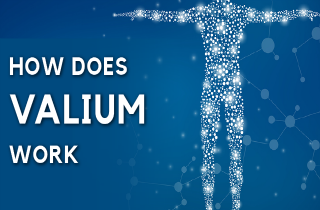Valium (diazepam) is a an anti-anxiety benzodiazepine drug that’s used to treat mood disorders, muscle spasms, and alcohol withdrawal symptoms.
How does Valium affect the body and brain? Does it have the same effects for everyone? What are the dangers and side effects of Valium use? Is Valium addictive? We’ll explore all those questions and more in this article. And we invite your questions about Valium at the end.
How does Valium work in the body?
Valium affects the levels of gamma-aminobutyric acid (GABA) in the brain, helping to slow down and stop abnormal brain activity. This results in a calming effect, and sometimes feelings of euphoria. It helps reduce anxiety, cause sleepiness, relax muscles, stop seizures, and more.
Valium can also have pleasant side effects such as altered mood, or relaxed state, but Valium can also cause unpleasant, and sometimes dangerous, side effects. The most common adverse side effects to Valium include drowsiness, stomach problems, and mood changes. But more serious issues such as seizure, irregular heartbeat, or tremors can occur, even at normal doses. There’s no way to predict who will experience these adverse effects, but they’re more likely to occur when Valium is taken in higher doses than prescribed.
How does Valium affect the brain and nervous system?
Valium is a central nervous system depressant. This means it slows brain activity. As a benzodiazepine, Valium interacts with neurotransmitters, especially GABA neurotransmitters, in the brain. Specifically, the diazepam in Valium binds with high affinity to the GABA A receptor in the brain to reduce arousal and to affect emotions. Diazepam further depresses the electrical after-discharge in the amygdala and hippocampus regions of the limbic system that affect emotions. Do you get high from Valium? Possibly, but not always. If you are using Valium therapeutically and taking Valium as prescribed, the chances that you become addicted to Valium are limited.
How fast does Valium work
Valium hits peak blood concentrations about 1 – 1.5 hours after being taken orally. At that point, Valium has taken full effect. Sometimes people will crush and snort or inject the powder from Valium tablets to try to get more immediate effects, but this is dangerous and can result in increased adverse effects, nasal infections, or overdose.
How long does Valium work?
The half-life of Valium is fairly long – it can take 20 hours or more for just half of the medication to be eliminated from your system. However, just because it’s not completely eliminated after 20 hours doesn’t mean it’s still effective. On the contrary, Valium is generally taken anywhere from 2-4 times per day in order to be effective.
What makes Valium work better?
Valium sometimes works better when taken without food. It’s better to take Valium a couple of hours after your evening meal, so that it absorbs faster into the body. On the other hand, Valium should not be taken along with other central nervous system depressants like alcohol or benzodiazepines. It can cause excessive drowsiness and even be dangerous when mixed with other medications.
Does Valium work for everyone?
No, Valium is not right for everyone. Valium is a habit-forming medication that’s not recommended for those with a history of drug or alcohol abuse. If you believe that you or a loved one are addict to Valium, there are many kinds of sedative addiction treatment programs available to help you get sober.
In some people Valium can have serious side effects. People who experience problems while taking it should talk to their doctor immediately about discontinuing the medication. People with certain medical conditions should not take Valium.
Finally: Can you die from Valium? Yes. Although it is difficult to take too much Valium and overdose on Valium usually requires hundreds of times the daily recommended dosage, or combing Valium with other drugs or alcohol.
How Valium works questions
Please leave us your questions about Valium below. We try to respond to all questions personally and promptly. If we don’t know the answer, we will refer you to someone who does.









Related Posts